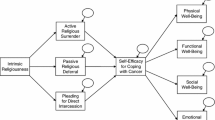Abstract
The concern of this article is to examine the relationship between religiousness and state-and-trait anxiety in a sample of cardiac transplantation candidates. Religiousness was made operational by integrating measures of religious orientation and religious coping with cluster analysis to form religious coping profiles. Three religious coping profiles were identified:Deferring/Collaborators, Self-Directors, andEclectic. Analyses of variance indicated that coping profiles were significantly different in their report of trait anxiety, such that the Eclectics reported a good deal more trait anxiety than did the Self-Directors. This leads to a discussion of the implications for the clinical presentation of religious coping profiles in cardiac transplantation candidates.
Similar content being viewed by others
References
Marcus, E., Wong, S.N.T., and Luisada, A.A. (1951). “Homologous heart grafts: Transplantation of the Heart in Dogs.Surgical Forum,2, 212–217.
Kriett, J.M., and Kaye, M.P. (1990). “The Registry of the International Society for Heart Transplantation: Seventh Official Report—1990.”The Journal of Heart Transplantation, 9, 323–330.
Suszycki, L.H. (1988). “Psychosocial Aspects of Heart Transplantation.”,Social Work, May–June, 205–209.
Kriett and Kaye,op. cit.. “The Registry of the International Society for Heart Transplantation: Seventh Official Report—1990.”The Journal of Heart Transplantation, 9, 323–330.
Brennan, A.F., Davis, M.H., Bucholz, D.J., Kuhn, W.F., and Gray, L.A., “Predictors of Quality of Life Following Cardiac Transplantation.”Psychosomatics, 1987, 28, 566–571.
Kuhn, W.F., Brennan, A.F., Lacefield, P.K., Brohm, J., Skelton, V.D., and Gray, L.A., “Psychiatric Distress During Stages of the Heart Transplant Protocol”The Journal of Heart Transplantation, 1990, 9, 25–29.
Ibid..
Auerbach, S.M. (1989). “Stress Management and Coping Research in the Health Care Setting: An Overview and Methodological Commentary.”The Journal of Consulting and Clinical Psychology, 57 (3), 338–395.
Acklin, M.W., Brown, E.C., and Mauger, P.A., “The Role of Religious Values in Coping with Cancer,”Journal of Religion and Health, 1983, 22(4), 322–333.
Bearon, L.B., and Koenig, H.G. “Religious Cognitions and the Use of Prayer in Health and Illness.”Gerontologist, 1990, 30 (2), 249–253.
McCrae, R.R., and Costa, P.T., “Personality, Coping, and Coping Effectiveness in an Adult Sample.”The Journal of Personality, 1986, 54(2), 385–405.
Park, C., Cohen, L.H., and Herb, L., “Intrinsic Religiousness and Religious Coping as Life Stress Moderators for Catholics vs. Protestants.”The Journal of Personality and Social Psychology, 1990, 59 (3), 562–574.
Ibid..
Schaefer, C.A., and Gorsuch, R.L., “Psychological Adjustment and Religiousness: The Multivariate Belief-Motivation Theory of Religiousness.”The Journal for the Scientific Study of Religion, 1991, 30 (4), 448–461.
Allport G.W., and Ross, J.M., “Personal Religious Orientation and Prejudice.”The Journal of Personality and Social Psychology, 1967, 5, 432–443.
Kirkpatrick, L.A., “A Psychometric Analysis of the Allport-Ross and Feagin Measures of Intrinsic-Extrinsic Religious Orientation.”Research in the Social Scientific Study of Religion, 1990, 1, 1–31.
Bergin, A.E., “Values and Religious Issues in Psychotherapy and Mental Health.”American Psychologist, 1991, 46, 394–403.
Baker, M., and Gorsuch, R.L., “Trait Anxiety and Intrinsic-Extrinsic Religiousness.”,The Journal for the Scientific Study of Religion, 1983, 21, 119–122.
Bergin, A.E., Masters, K.S., and Richards, P.S., “Religiousness and Mental Health Reconsidered: A Study of an Intrinsically Religious Sample.”The Journal of Counseling Psychology, 1987, 35, 197–204.
Frenz, A. W., and Carey, M. P., “Relationship Between Religiousness and Trait Anxiety: Fact of Artifact,”Psychological Reports, 1989, 65, 827–834.
Kirkpatrick, L.A., and Hood, R.W., “Intrinsic-Extrinsic Religious Orientation: The Boon or the Bane of Contemporary Psychology of Religion?”The Journal for Scientific Study of Religion, 1991, 29 (4), 812–818.
Gorsuch, R.L., and McPherson, S.E. “Intrinsic/Extrinsic Measurement: I/E-Revised and Single-Item Scales.”The Journal for the Scientific Study of Religion, 1989, 28(3), 348–354.
Kirkpatrick,op cit.“.
Gorsuch, R.L., and Venable, G.E., “Development of an ‘Age Universal’ I/E scale.”The Journal for the Scientific Study of Religion, 1983, 22, 181–187.
Allport and Ross,op cit.“.
Pargament, K.I., Kennell, J., Hathaway, W., Grevengoed, N., Newman, J., and Jones, W. “Religion and the Problem-Solving Process: Three Styles of Coping.”The Journal for the Scientific Study of Religion, 1988, 27(1), 90–104.
Ibid..
Spielberger, C.D., Gorsuch, R.L., and Lushene, R.E.,State-Trait Anxiety Inventory Manual. Palo Alto, CA: Consulting Psychologists Press, 1970.
Park et al.op cit..
Pargament, K.I., “God Help Me: Toward a Theoretical Framework of Coping for the Psychology of Religion.”Research in the Social Scientific Study of Religion, 1990, 2, 195–224.
Acklin et al.,op cit..
Author information
Authors and Affiliations
Rights and permissions
About this article
Cite this article
Sears, S.F., Greene, A.F. Religious coping and the threat of heart transplantation. J Relig Health 33, 221–229 (1994). https://doi.org/10.1007/BF02354913
Issue Date:
DOI: https://doi.org/10.1007/BF02354913



